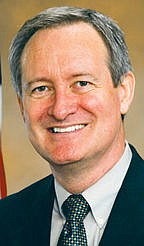Advocating for rural Idaho schools
The federal government is responsible for the impact of federal land ownership on local communities. Secure Rural Schools and Self-Determination (SRS) Act payments are one way the federal government contributes to meeting this responsibility. Congress must extend the SRS program this year to avoid any lapse in payments as we continue to work toward the goal of a permanent solution that alleviates uncertainty for Idaho counties.
Counties often rely on property taxes to provide basic public services and infrastructure maintenance for local communities. However, lands managed by the federal government cannot be taxed by local or state governments, and more than 60 percent of Idaho is federal land.
In a 1908 law, Congress directed the return of 25 percent of U.S. Forest Service gross receipts to the states to assist counties that are home to our national forests with roads and schools. However, over the years, timber receipts have eroded to the point where the federal obligation to local rural communities is not met through the receipts alone.
To address the shortfall and prevent the loss of essential county schools and roads infrastructure, in 2000, Congress passed the Secure Rural Schools and Community Self-Determination Act. This law has provided assistance, known as SRS or county payments, to communities whose regular Forest Service and Bureau of Land Management receipt-sharing payments have declined significantly.
Nearly 80 percent of Idaho’s counties receive county payments because of the large amount of National Forest System land in Idaho. Idaho’s rural counties rely on SRS payments to ensure funding for schools, road maintenance, public safety, search and rescue operations as well as mental and physical health services. Idaho counties received a total of $26.9 million in payments for Fiscal Year (FY) 2022 under the SRS program.
Congress has extended and amended the Secure Rural Schools program multiple times. It was last extended for three years through 2023 and is due for renewal. In December, we saw welcome progress in this effort with the Senate Committee on Energy and Natural Resources’ passage of legislation I introduced with fellow U.S. Senators Jim Risch (R-Idaho), Ron Wyden (D-Oregon) and Jeff Merkley (D-Oregon) to extend the program through 2026. This is an important step in the ultimate goal of alleviating uncertainty for rural county governments.
The federal government’s overspending problem, which has resulted in a more than $34 trillion and growing national debt, makes it increasingly difficult to ensure the federal government meets its responsibilities, including SRS payments. Nevertheless, I remain committed to enacting a long-term solution that provides a consistent mechanism for the federal government to meet its responsibilities while controlling federal overspending. As we work to strengthen revenue sharing with local governments by increasing timber harvests and restoration work on federally-managed lands, the SRS program remains an important backstop to protect counties from losses during low-harvest years. I will continue to press for enactment of legislation to help the federal government prudently meet its responsibility to communities home to federal lands.
• • •
Mike Crapo represents Idaho’s First Congressional District in the U.S. Senate. He can be reached at crapo.senate.gov.

